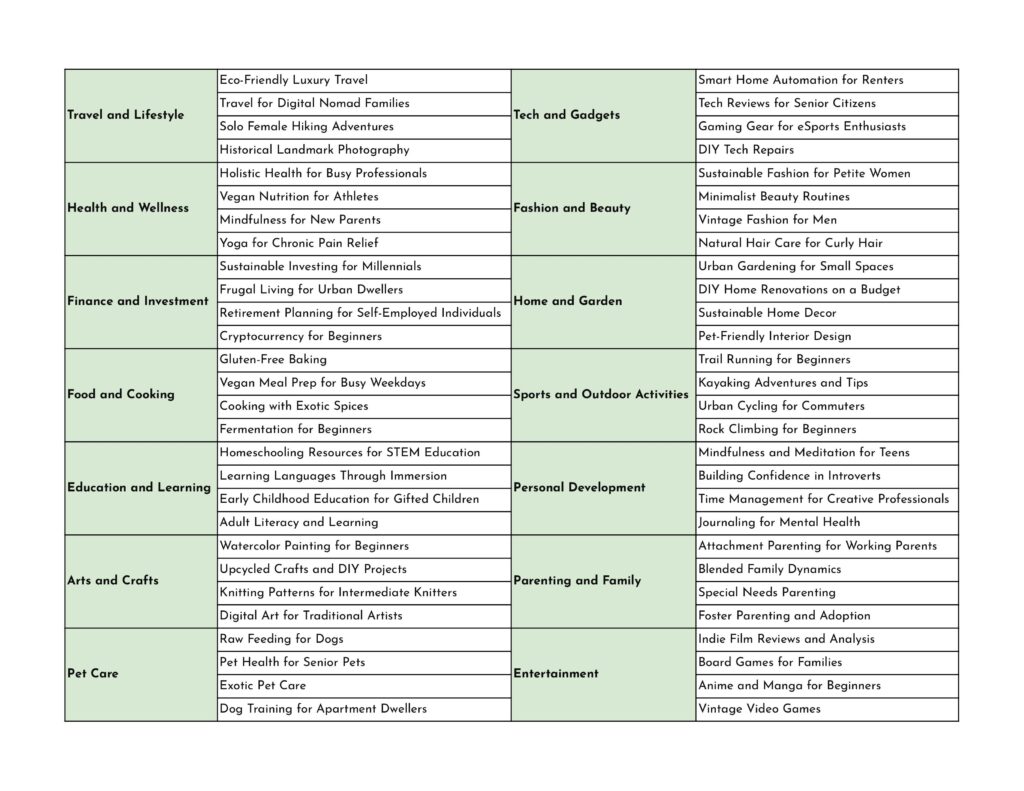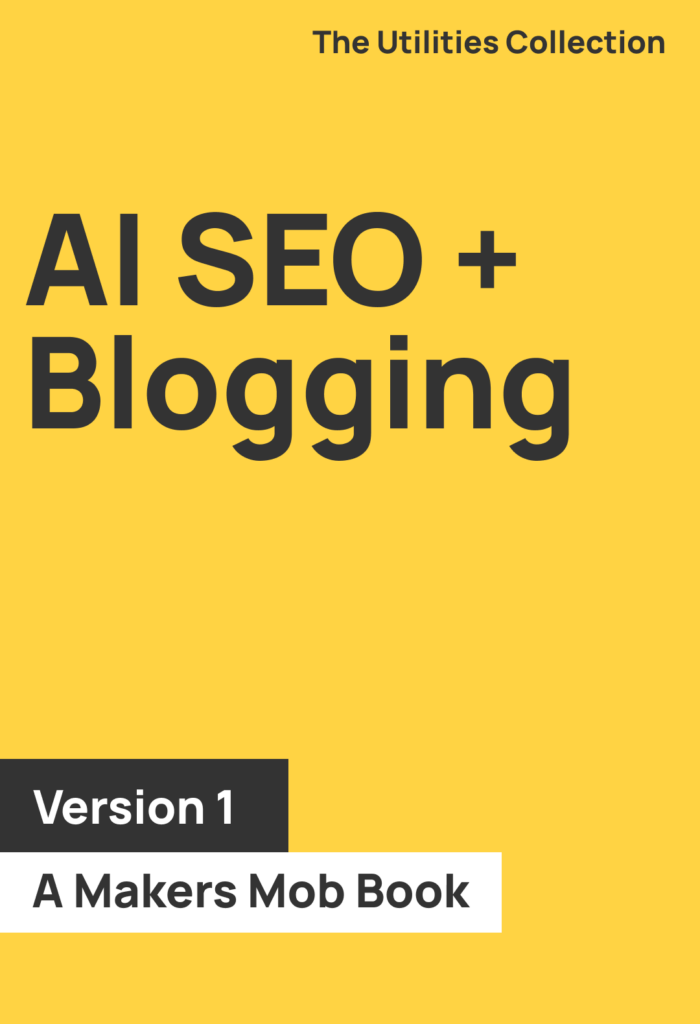You’re here because you’re hoping to find a blog niche that will make you money. And that makes sense because why else would you blog?
Over the years I’ve made over $1,000,000 that I can attribute to blogging and I’ve helped 100s of students quit their jobs, make quality side income, and find more freedom with their blog.
So I understand a thing or two about what makes a blog niche profitable.
But the title of this post isn’t quite correct.
It shouldn’t be 403+ blog niches.
It should be an infinite amount of blog niches that make money.
I didn’t stutter.
Infinite is a pretty big number and you might not believe what I’m saying here and I don’t blame you.
In the traditional sense, when it comes to blogging what do you have available for you? In the past, I would’ve said you should stick to these if you were looking for the most profitable blog niches:
- How to make money
- Personal finance
- Food
- Fashion
- Travel
- Crafts
- Pets
That was pretty much it.
But that’s a bit ridiculous, isn’t it? 7 blog niches for everyone to share?
It felt like if you started a blog outside one of those niches then you stood absolutely no chance of success.
People would continue to ask me what was the best niche for blogging and the answer is pretty simple.
One of those 7 above that you could tolerate working with.
But that isn’t the case now.
Actually, it was never the case.
It was just that so many bloggers were seeing success with Pinterest back in the days that you wanted to choose a niche that worked well on Pinterest.
Well, now that Pinterest no longer sends new blogs gobs of traffic that leaves a bit more room for strategy.
And that strategy is understanding what a niche really is. So let’s find that blog niche is going to be the most profitable for you.

What Are Blog Niches?
It’s easy to think that a niche is a topic. That’s why you go looking for “profitable” blog niches, right?
But let’s think about this in a fancy way by first asking a very important question.
Why do people spend money?
I think it’s a good question to ask because if you know the answer then you can see if you can apply it to a niche, right?
So why do people spend money?
They spend money because of improvement. That’s it.
People buy improvement.
Improvement Brings In Money
Everything that you buy is because you believe it’s going to improve your life in some way. Don’t try to use logic on this one because it’s almost always emotional.
Maybe you’ll pay the auto mechanic that ridiculous sum because it will stress you less to have a working car.
Maybe you buy that candy bar that you shouldn’t be eating at the checkout line because you know it will take your mind off missing the last lunar eclipse.
We buy things because we believe they will improve our lives.
Whether they do or not is a completely different take.
“Alright, now that we know WHY people spend money, we need to look at a niche to see if people are willing to spend money to improve. Improve what? Well, that’s the key. If you figure that out, then you have a niche you can monetize.”
To dive deeper into whether this niche holds profitability, start with some good old-fashioned keyword research. This will help you gauge the interest level in your niche topics and confirm if there’s a substantial audience eager for content. Look for keywords that indicate a problem or desire for improvement—exactly where people are ready to invest.
Once you’ve identified a promising niche, explore how you can turn this interest into revenue. Consider the potential for ads, sponsored content, or even a subscription model. These are all viable ways to monetize your niche if the demand is there.
Don’t know where to start? There are tools out there to kickstart your brainstorming and validate your niche ideas. These tools can spark creativity and help ensure your niche is not just a fleeting trend but a sustainable avenue for profit.
But wait, what about ads?
That’s an important question to ask.

Making Money With Ads on Your Blog
You might be here because you imagine building a blog, getting a ton of traffic, and then plastering the site with ads so you can sit back and drink tequila.
You might feel like you’re stuck in the worst job in the world and you want out. And that might be the case.
But I bet it’s not worse than the worst job I ever had. I used to work in the “can shed”. Yes, that’s right. It was the place where people would drop off their empty cans for recycling. I had to sort them out.
(You don’t want to know what that smells like. You also don’t want to know the other things that people throw into the bag that are supposed to just be recyclables. You really don’t want to know.)
So, I get it. I used to build blogs that did exactly that. Get tons of traffic and bring in the ad money.
And that’s why I had blogs in only the niches that I talked about earlier.
Getting Blog Traffic Isn’t Easy
But that was when getting a lot of traffic was pretty easy thanks to Pinterest and not much competition on Google.
But the blog world is different now.
Pinterest doesn’t send the massive amounts of traffic it used to UNTIL you’re ranking for a lot of different keywords consistently.
Sure you’ll still see people talking about the good traffic they get from Pinterest, but that’s because they’ve been on it for years and have 1000s of pins loaded up in it and they rank in Pinterest search.
For you? Just getting started?
It’s going to take a LONG time to get any decent traction. Why does this matter?
Because I’m sure you want to start a business here and not a hobby. Hobbies are where you end up losing money but that’s okay because you’re having fun.
Not many people start a blog as a hobby.

We had blogs where getting to $700 a month wasn’t difficult.
Now, I don’t know your situation so you might be saying that an extra $700 a month sounds great and I hear ya.
I’m not one to turn down money.
But what if I told you that it could take you 6+ months to get to that 50,000? Most bloggers don’t even make it within a year.
That’s a lot of effort to put in for just $700 a month.
If you’re looking for the most profitable blog niches then using ad revenue as the deciding metric might not be the wisest move. It takes a lot of traffic to make decent money with ads and time is money.
Let’s not forget that you have to hope that your pageviews rise over time and not fall because Pinterest or Google decide to make a change.
The Google Analytics Trap
Every day you’re left staring at your Google Analytics hoping to see the number climb. It’s fun until it’s not.
I don’t want that life for you so it’s not something I recommend.
If you’d like to get more of my thoughts on Blogging then check out my post Blogging Is Dead.
The main problem with ads though is that you need a lot of traffic and if we’re being honest, every topic that you can think of for a niche doesn’t lend itself to getting a ton of traffic.
What’s a ton?

(Note: Here are numbers for the first 6 months of this site. You can see how long it took me to get that many daily impressions from Google and I know what I’m doing! But an impression doesn’t mean a click and that’s where the struggle starts to happen when you want to put your financial future in the hands of ads.)
I’d say over 300,000 pageviews is what you’d be hoping for because that begins to put you in the $5,000+ a month range.
But what happens if you want to talk about publishing books?
That’s certainly not a niche that is going to get you a ton of traffic. So do you ignore it and write about couponing instead?
Not at all.
You go back to the question of why do people spend money and what do they spend money on.
From there, you’ll see the perfect business model for you.
Creating Digital Products Leads to $300 Days Every Single Day
A digital product is simply a solution that you’ve packaged up in a nice way for someone. This solution is the improvement that they’re looking for in their life.
Let’s stick with the book publishing example.
If someone wanted to publish a book but they don’t know what to do, what things could greatly improve their lives?
- Finding an agent
- Writing to publishers
- Self-publishing
- Building an audience
I’m sure there is more but you get the gist. Each of the items on the list could be turned into an offer that you could sell to your audience.
What if one of those offers was a $199 offer?
How many would you need to sell to reach the $5,000-a-month goal that we just talked about?
25.
That’s it.
That’s a HUGE difference from trying to get 300,000 pageviews isn’t it?
In fact, that means you could start from day 1 trying to make money. With ads that isn’t going to happen. With ads you’re hoping for at least month 6.
And that’s the thing. If you’re going to spend that time working, why not work on creating an offer and selling it to the people you interact with?
And that’s why there is an almost infinite number of blog niches that you could start and make money with.
You just have to make sure that you can come up with a solution that people are willing to pay for.
When it comes to picking a niche it’s important to also understand how you’re going to be monetizing your blog.

A List of 400+ Profitable Blog Niche Ideas
However, if you’re still stuck then here is a list of over 400 blog niches you could consider. Maybe it will jumpstart some ideas.
And no, you don’t need to sign up for anything.
But we aren’t done yet.
Exploring Emerging Blog Niches
Diving into the world of blogging, it’s crucial to stay ahead of trends and tap into fresh niches. Here are some emerging areas that are gaining traction:
- Sustainability and Eco-Living
As more people become environmentally conscious, blogs focusing on sustainable practices, eco-friendly products, and green living are becoming increasingly popular. This niche can include topics like zero waste living, sustainable fashion, and renewable energy solutions. - Mental Health and Wellness
The conversation around mental health is more open than ever. Blogs discussing mental well-being, mindfulness practices, and strategies for coping with stress resonate with readers seeking support and guidance. - Remote Work and Hybrid Lifestyles
With the shift towards remote work, there’s a demand for content about productivity tips, home office setups, and balancing work-life integration. This niche appeals to both budding freelancers and established professionals transitioning to remote roles. - Digital Nomad Adventures
The rise of the digital nomad lifestyle has sparked interest in travel blogs catering to remote workers. Content can range from country guides and budget travel tips to advice on finding reliable Wi-Fi spots around the globe. - Tech Innovations and AI
As technology rapidly evolves, there’s a growing appetite for blogs covering new advancements, especially in artificial intelligence and the Internet of Things (IoT). This niche attracts tech enthusiasts eager to learn about the latest gadgets and software developments. - Plant Parenthood and Urban Gardening
With urban spaces shrinking, more people are exploring indoor gardening. Blogs providing tips on plant care, urban gardening, and transforming small spaces into green havens serve an expanding community of plant enthusiasts. - Niche Hobbies and DIY Projects
People looking to channel creativity are turning to blogs about unique hobbies like resin art, woodworking, and home DIY projects. These blogs offer step-by-step guides, project inspiration, and community engagement for hobbyists.
By identifying and writing within these emerging niches, aspiring bloggers can carve out a space that not only captivates audiences but also aligns with their personal interests and expertise.
How Can Keyword Research Help Determine the Viability of a Blog Niche?
Keyword research is a crucial first step in evaluating your blog niche’s potential. By investigating specific keywords related to your topics, you can gauge the overall interest and demand within your niche. Here’s how it benefits your blogging journey:
- Assessing Interest Levels: Analyzing search volume for specific keywords reveals how many people are looking for content like yours. High search volumes indicate strong interest, suggesting a potentially successful niche.
- Understanding Competition: Keyword research tools help you identify the competition’s strength. If the top-ranking sites are well-established, it might be challenging to break through. Look for niches with moderate competition where you can stand out.
- Monetization Opportunities: Effective keyword research can also uncover monetizable opportunities. Discover niche areas with keywords that advertisers are willing to pay for, signaling possibilities for ad revenue, sponsored content, or subscriptions.
- Idea Generation: As you delve into keyword research, you’ll uncover numerous related topics. These insights can inspire a wide range of content ideas, ensuring you have enough material to sustain your blog long-term.
- Trend Identification: Identifying trends through keyword fluctuations can position your blog to capture emerging interests, giving you an edge in creating timely and relevant content.
By systematically exploring these facets of keyword research, you’ll be better equipped to select a niche that’s both appealing to your target audience and sustainable for you.
Understanding Low Competition Blog Niches
A low competition blog niche is a specialized topic area on which you can create content and effectively stand out in the crowded blogging landscape. It’s a niche that, while relevant and valuable, doesn’t have an oversaturated amount of content already available. This can provide an opportunity for new bloggers to attract readers more easily and establish authority within their chosen field.
Characteristics of a Low Competition Niche:
- Specific Focus: These niches target specific subjects or audiences. Instead of broad themes like “health” or “technology,” a low competition niche might focus on “natural remedies for seasonal allergies” or “technology solutions for small non-profits.”
- Unique Angle: A successful low competition niche often includes a fresh perspective or innovative approach that hasn’t been extensively covered. This could involve exploring new trends, unheard narratives, or unpopular viewpoints that pique curiosity.
- Audience Value: Despite the limited competition, the niche should provide genuine value to a clearly defined audience. Understanding the needs and challenges of your potential readers is key to ensuring consistent engagement.
How to Spot a Low Competition Niche:
- Keyword Research: Utilize tools like SEMrush, Ahrefs, or Ubersuggest to find potential niches with low keyword competition. Look for keywords that have a decent search volume but aren’t overly competitive.
- Social Media Trends: Platforms like Reddit, Pinterest, and industry-specific forums can reveal niche topics that are generating interest but haven’t been widely covered by blogs.
- Competitor Analysis: Identify what other bloggers in your broader field are focusing on. Gaps in their content offer opportunities for you to create something unique.
- Community Involvement: Engage in online communities or forums to observe common questions and underserved topics. By actively participating, you can uncover emerging interests and unmet needs among your target audience.
Selecting a low competition niche requires creativity, research, and a keen understanding of your audience’s desires. By choosing wisely, you can carve out a successful space in the blogosphere that resonates with readers and stands the test of time.
What Blog Niches Make the Most Money?
This is the big question to ask because I know some of you reading this just want to jump into the realm of making 8 figures a year. But it’s the question I had to answer before I could start making 6+ figures every year for the past decade.
While there is no surefire niche that will make you money because it depends on how good you are at whatever you’re doing, there are some blog niches that make life a little bit easier to make money. Why? Because humans are pretty simple creatures.
We have 3 major vices:
- Health
- Wealth
- Love
I call these The 3 Egos. If you want a blog niche that gives you slightly better odds then you should look directly into blog niches that deal with one of those three categories.
But let’s get more specific here.
According to recent data from RankIQ, the highest traffic-generating blog niches are food, lifestyle, travel, and arts/crafts. These categories make up a whopping 74% of all high-traffic blogs. Not only do they draw in the crowds, but they also pave the way for higher earnings.
Food blogging stands out as the most profitable niche, generating the highest median income. It leads the pack with a significant number of blogs boasting over 50,000 average visitors a month. Meanwhile, personal finance takes the second spot in terms of earnings, proving that money matters hold significant appeal.
Here’s where the magic happens: the secret is that if you can combine your preferred blog niche with one of the three vices above, then you’re golden.
What do I mean? Well, let’s go back to the book publishing example.
Sure, the main topic is book publishing but you can also integrate wealth and love in there.
How?
Wealth is pretty easy. If you publish books you can make money.
Love? If you publish books you might become more popular and the people you admire will start to love you.
Possibly.
No matter what niche you pick, you always want to see how you can fit one, two, or three of the vice categories above into the mix because those are always guaranteed to draw the attention of your audience.
When you’re thinking of big traffic to get ad revenue, then that’s one of the things you’re trying to accomplish.
Gardening is a perfect example.
With gardening, it can be about health as you grow your own food and working out in the garden is exercise.
It can be about wealth, maybe you sell the things you grow.
It can be about love as you proudly show off your beautiful garden and make people jealous.
Essentially, one of those three vices is always going to be in play for your niche. It’s your job to integrate it.
This is why you’re really working with an infinite amount of blog niche ideas. It’s too easy to see someone not making money with their church group blog and think that the niche is dead.
It isn’t.
They just haven’t found a way to incorporate one of the three vices within it.
By focusing on niches like food, personal finance, and others within the realm of The 3 Egos, you’re setting yourself up to tap into proven markets. Remember, it’s not just about picking a niche—it’s about infusing it with elements that captivate and engage your audience.
Here I explain it in a different way on TikTok.
The Blog Niche Secret
But there’s a secret here and if you can apply this to your blog niche choice then you’re going to be in good shape.
That secret is that if you can combine your preferred blog niche with one of the three above then you’re golden.
What do I mean? Well, let’s go back to the book publishing example.
Sure, the main topic is book publishing but you can also integrate wealth and love in there.
How?
Wealth is pretty easy. If you publish books you can make money.
Love? If you publish books you might become more popular and the people you admire will start to love you.
Possibly.
No matter what niche you pick you always want to see how you can fit one, two, or three of the vice categories above into the mix because those are always guaranteed to draw the attention of your audience.
When you’re thinking of big traffic to get ad revenue, then that’s one of the things you’re trying to accomplish.
Gardening is a perfect example.
With gardening, it can be about health as you grow your own food and working out in the garden is exercise.
It can be about wealth, maybe you sell the things you grow.
It can be about love as you proudly show off your beautiful garden and make people jealous.
Essentially, one of those three vices is always going to be in play for your niche. It’s your job to integrate it.
This is why you’re really working with an infinite amount of blog niche ideas. It’s too easy to see someone not making money with their church group blog and think that the niche is dead.
It isn’t.
They just haven’t found a way to incorporate one of the three vices within it.
A $10,000 Per Month Knitting Blog
This is Nancy Queen. She’s a student of ours and she runs Noble Knits.
A blog about knitting that makes over $10,000 per month.
She started off with ads and affiliate marketing but found that she was hitting a ceiling. When she started to create offers around knitting she was able to skyrocket her revenue.
A $20,000 Per Month Freezer Meal Guide Blog
This is Rachel Fairchild. She’s a student at Pocket Business and she runs This Crafty Home.
Ironically, the blog is no longer about crafts.
She scaled her blog to $4,000 which is great!
Then she scaled it to $10,000 which is even better!
What Is the Best Niche for Blogging?
This is going to sound cheesy but the best niche for blogging is going to be the one in which you can maintain a long-term interest.
I say this because you’re going to spend a lot of time creating content and talking about the same topics over and over and over again.
You really have to have an interest in doing this if you want any chance to make money with it because you can’t just write and think that your stuff is going to be better than others.
You truly have to bring your best self, grow, and continue to improve as you try to grow your blog.
It’s too easy to try and hunt down the perfect blog niche just to make money only to find that it doesn’t hold your interest for very long.
But if you want another answer…
What Are the Best Blog Niches for Beginners?
Starting a blog can be both exciting and daunting. Choosing a niche that resonates with you is crucial, as it keeps you motivated and engaged. Here are some beginner-friendly blog niches that offer plenty of room for creativity and personal expression:
Personal Growth and Self-Improvement
Dive into the world of personal development by sharing your journey towards self-betterment. Discuss topics like improving time management skills, setting and achieving goals, or overcoming personal challenges. Enhancing these discussions with your own experiences can inspire and connect with readers on a deeper level.
Smart Budgeting and Shopping Tips
If you have a knack for managing money, consider writing about budget shopping strategies. Offer insights on scoring the best deals, especially on groceries, and recommend stores for specific sale items. Share your tried and tested techniques for stretching a budget to help others navigate financial constraints.
Affordable Home Makeover Ideas
Bring flair to your blog with cost-effective home decor ideas. Explore DIY projects, offer organizational tips, and showcase budget-friendly design inspirations. Your readers will appreciate the creativity and practicality these ideas bring to their living spaces.
Fitness and Healthy Living for Newbies
Cater to individuals starting their fitness journeys with simple workout plans and wholesome recipes. Provide beginner-friendly advice that’s easy to follow. Drawing from your own success stories can improve authenticity and motivate your audience.
The Freelance Lifestyle and Remote Work Tips
Guide readers through the intricacies of freelancing and effective remote work practices. Share insights on utilizing popular freelancing platforms, enhancing productivity, and setting up a conducive home office environment. Whether you’re a seasoned freelancer or just starting, your tips can be invaluable.
These niches not only allow you to explore your interests and expertise but also offer abundant opportunities to connect with a wide audience. By bringing your unique perspective into these areas, you can create engaging content that stands out in the vast blogging landscape.
Remember, it takes time to build up a lot of traffic to make money with ads so that leaves you with the following methods of making money from Day 1:
- affiliate marketing
- selling your own offers/services
What about sponsored posts? Think of them as ads. Brands want exposure and if you don’t have the audience then they aren’t going to pay.

How to Choose Your Blog Niche
So with all of this in mind, how do you actually choose a blog niche?
To keep it simple you can break up niche ideas into two categories:
- Interests
- Opportunities
Interests
As I mentioned before, these are things that you feel you could talk about forever. There is a general misconception that to blog about something you have to be an expert at it.
That isn’t true.
You can learn over time. I used to have 27 different blogs running at one time.
Most of them were in niches that I didn’t care about, but I was still able to grow them because each topic was just another opportunity for me to do research.
If I was a robot I could continue to go this route, but I just find life more enjoyable when I get to talk about things that interest me.
So when it comes to interests it could be things that you have experience with now and love or it can be things that you always wanted to try.
Either way, you’re going to grow over time with the niche so it doesn’t really matter.
Opportunities
These are the blog niches where you see an opportunity to make a dent.
It might be an under-served niche or one that you feel should take a new direction.
You’ll still want to develop an interest in the long-term, but there is nothing wrong with starting with an opportunity because it’s there, and then loving it over time.
For example, I used to be in the #1 spot on Google for the “Keto Diet”. True story.
I had a Keto site that was doing over $40,000 a month simply because it ranked #1 on Google.
How was I able to rank? I saw an opportunity and got in on the Keto craze before the other sites.
Unfortunately, more medically backed sites eventually took over my spot and I didn’t want to fight them for it as they had teams working on content and I had just me trying to think of a new Keto Recipe.
But sometimes there are opportunities to find blog niches ready for you to lead them if you know how to look. Unfortunately, this is beyond the scope of this post but you might be surprised to find that something you’re interested in really isn’t being served well online.

Narrow or Broad?
There is always a concern if you’re too narrow or too broad with your niche selection.
I’d rather start narrow and then expand as I improve.
It’s also easier to build up an awesome resource when you start narrow.
For example, we had a home decor blog where we started specifically with bedroom decor. We could’ve gone even more narrow, but we figured that was enough.
But we didn’t stay in bedroom decor forever. We expanded out to other sections of the home, but by starting on a more narrow niche it allowed us to have more focused content which also helped with SEO.
It’s very easy to say that you’re going to start a health blog and write about all things health. There is absolutely nothing wrong with that in the long term, but in the short term, you really want to narrow your topics, build a cluster of content, and then expand from there.
This usually means that when you choose a domain name, you don’t want to be too specific with it. Going back to Bogoten, that name doesn’t mean anything.
I completely made it up so we actually have free reign to talk about whatever we want.
However, if we called it BedroomDecorDepot then we’re pretty much stuck.
The funny thing about the narrow vs broad debate is that it makes people think that a niche blog is different from any other type of blog.
What Is a Niche Blog?
When you hear the SEO and Affiliate Marketing pros talk about blog niches that make money, they tend to focus on what they refer to as niche blogs.
But what is a niche blog and is it any different from a regular blog?
The reality is that it’s not different.
It’s just that when most people start blogs, they tend to go broad because they want to talk about a lot of different things.
With a niche blog you’re sticking to a narrow niche (narrow is defined however you want) and only staying with that.
A coffee blog ONLY talks about coffee and would be considered a niche blog.
If you want to be technical ALL blogs are niche blogs, but if you’re talking to a SEO expert or affiliate marketer they’ll see a niche blog as a blog that’s highly targeted to a specific topic.

More Niche Questions
Let’s answer some of the more common questions when it comes to finding your blog niche.
What Steps Should Be Taken to Start a Niche Blog?
Creating a niche blog involves several key steps to ensure your content reaches and resonates with your target audience. Follow these guidelines to set up your blog successfully:
- Select a Platform and Design a Template
- Choose a blogging platform that suits your needs, such as WordPress, Squarespace, or Medium.
- Select a website template that reflects your niche’s theme and aligns with your personal voice and style. Visual consistency helps attract the right audience.
- Secure a Memorable Domain Name
- Register a domain name that makes your blog easy to find and remember. Aim for something short, relevant, and unique to your niche.
- Craft Content That Establishes Authority
- Develop blog posts that provide valuable insights, answer reader questions, and position you as an expert in your niche.
- Use SEO strategies to help your content rank higher on search engines, increasing organic traffic.
- Optimize Website Performance and Security
- Ensure your website loads quickly and is mobile-friendly. A seamless user experience keeps visitors engaged.
- Implement strong security measures to protect your content and maintain site uptime, ensuring your blog remains accessible.
- Promote Your Blog to Expand Reach
- Utilize social media platforms, email newsletters, and collaborations with other bloggers to spread the word about your blog.
- Consider guest posting, participating in forums, or engaging in online communities related to your niche to draw in more readers.
By following these steps, you’ll create a niche blog that effectively communicates your passion and expertise while reaching the audience you aim to serve.
Is starting a food blog a good idea?
It really depends on the approach that you take. The problem with most people that start a food blog today is that they see the food blog as a recipe blog and that’s it.
That’s a recipe blog, not a food blog.
If you want to start a food blog then understand who your audience is going to be. The main problem with recipe blogs is that each blog post is just a recipe and the people just want the recipe and that’s it.
They don’t care about the story or the other content. It’s why almost every recipe blog has to rely on ads as their main source of revenue.
A true food blog though can contain recipes, but also talk about food and people’s love for it.
If you want to read more of my thoughts on this then check out my guide on starting a food blog.
What is a micro niche blog?
We kind of touched upon this earlier, but it’s really finding a narrow niche and going even more narrow.
For example, if you start a blog on vacuums that’s pretty narrow, but a blog on Dyson vacuums is even more narrow.
The goal of a micro-niche blog is to either sell affiliate offers or your own offers. You almost never see ads on a micro-niche blog because the volume of traffic is too low.
For a micro-niche blog to succeed you really have to understand your target audience and become an expert on the blog topic.
Here are some examples:

Can you make money with a lifestyle blog?
This is a really good question mainly because a lifestyle blog is so broadly defined. What is a lifestyle blog?
I like to define it as a blog that talks about a lot of things without looking like it has a truly defined niche.
For example, a blog that talks about home decor, travel, and cooking would be a lifestyle blog because it feels more like a lifestyle than anything.
Back when it was easier to get traffic from Pinterest, lifestyle blogs made a lot of sense to start. Now they are a bit more difficult to monetize because you need a lot of traffic to them.
The problem is that when you talk about varying topics you’re bringing in an audience that is all over the place.
If I have a coffee blog then I know I’m only attracting people with an interest in coffee.
When I have a lifestyle blog bringing in some people who like cooking, some that like travel, and some that like parenting then who do I sell to?
It starts to get pretty complicated so that’s why you see most lifestyle blogs resort to two methods of making money:
- ads
- how to blog products
When you’re trying to make money online your best bet is to always start with narrow audience and work your way out. Lifestyle blogs start wide and stay wide.
Be sure to check out How to Start a Lifestyle Blog and Actually Make Money.
How does a travel blog make money?
Most travel blogs tend to make money by showing other people how to make a living blogging. The travel portion of the blog is just a front.
I don’t think this is always by design, but it can be hard to monetize travel content.
A travel blog could make money just like every other single-topic blog: by selling offers.
We work with a number of travel bloggers that focus on creating offers for their audience and that is their main revenue source.
It just comes down to understanding your audience and providing them with the solutions that they need for their problems.
Is mental health a good niche for a blog?
It really depends on the sub-topic that you’re talking about. Mental health on its own is pretty broad and it’s one of those topics where you have to ask yourself if people do want to spend money to improve.
If you want to explore this question further then check out Blogging About Mental Health: Should You Bother?
Should I start a book review blog?
You’d be surprised how often I get asked this question and the answer is yes if that is your thing. However, you should consider the different options you have of making it into a business so be sure to check out How to Create a Book Review Blog.

Making a Decision
I know that one of the hardest things about blogging for some people is actually choosing from one of the infinite amounts of blog niches at their disposal.
Let me just say that rarely is there a wrong pick. You just have to do your research and ensure that it’s a niche where people have no problem spending money.
Sometimes you may need to switch your thinking around.
For example, instead of frugal living why not think about it as teaching people how to have more money?
A simple switch like that can completely change your fortunes.
Besides looking at other blogs don’t hesitate to see if there is a popular YouTube Channel that covers your niche.
There are so many “hidden” online businesses that work within blog niches that you would never imagine. You just have to keep an eye open and continue to look around.
Same with social media. You’d be surprised how well people do on Instagram and TikTok in niches that you would never think of.
What If I Still Can’t Decide Between Blog Niches?
There is a question that you should ask yourself whether you’re trying to decide between blog niches or not.
What do you want to be known for?
I was asked that question a few months ago.
At first, I was like, OH, cool question. Thought-provoking! I’ll spend some time thinking about it.
I made some lists and thought about the things I would want to be known for. Things that had legacy potential.
And then I got really scared. Because I was really passionate about one of those things and I was super excited about that at first and then I got scared. What if I mess up? What if I don’t know enough? What if people laugh at me?
That’s how you know what to blog about. The one you feel super passionate about also scares you to death a little.
The 18 Most Popular Types of Blogs
If after all of this, you’re still wondering what are the most popular blog topics, then don’t worry because I got you covered.
Here they are in no particular order:
- Fashion
- Food
- Travel
- Music
- Lifestyle
- Fitness
- DIY
- Sports
- Finance
- Political
- Parenting
- Business
- Personal
- Entertainment
- Car
- Tech
- Sports
- Pet
What Next?
If you still aren’t sure about your niche then I suggest you check out our mega guide on How to Make Money Blogging.
Understanding the whole blog business can give you a better idea of the niche that you’re thinking about is really the one that you want to pursue.
It’s very easy to look at popular blogs and assume that you have to go with a niche like them.
The blogs that I’ve made the most money with usually had the least amount of traffic, but they did a great job of targeting a specific audience within the niche.
And if we’re being honest, one of the most fun aspects of creating a blog is being at this stage where the world is your oyster and you’re not locked down by a specific niche yet.
If you want to make this blog thing work then I can show you how to do that by turning it into an Automated Sales Machine.

